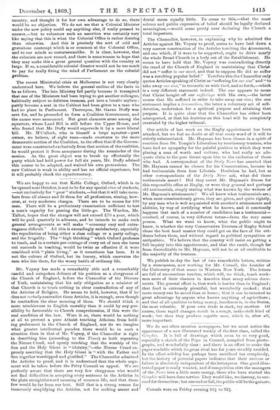Mr. Voysey has made a remarkably able and a remarkably
candid and outspoken defence of his position as a clergyman of the Church of England, before the Chancellor of the Diocese of York, maintaining that his only obligation as a minister of that Church is to teach nothing in clear contradiction of any of the Articles of Religion. He seems to hold, however, that if he does not verbally contradict those Articles, it is enough, even though he contradicts the clear meaning of them. We should think it more mischievous to English morality than it could by any pos- sibility be favourable to Church comprehension, if this were the real condition of the law. Were it so, there would be nothing at all to prevent a pure Atheist teaching Atheism from hold- ing preferment in the Church of England, nor do we imagine what greater intellectual paradox there would be in such a situation than in that of Mr. Voysey, if the Chancellor is right in describing him (according to the Times) as both repeating the Nicene Creed, and openly teaching that the worship of the Son and the Holy Ghost is " idolatry,"—the Nicene Creed ex- pressly asserting that the Holy Ghost is " with the Father and Son together worshipped and glorified." The Chancellor admitted the Articles to proof, and it is understood that the whole argu- ment will be taken before the Privy Council on appeal. We are perfectly aware that there are very few clergymen who would not find difficulties in accepting every sentence in the Articles in the plain straightforward meaning of common life, and that those few would be far from our best. Still that is a strong reason for immensely simplifying the Articles, not for making assent and denial mean equally little. To come to this,—that the most solemn and public expression of belief should be legally declared meaningless,—would come pretty near declaring the Church a total imposture.


































 Previous page
Previous page